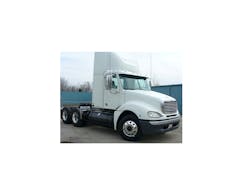Natural gas glider kit unveiled
LOUISVILLE, KY. According to American Power Group (APG), the first natural gas dual fuel glider kit available for the North American market will be available on June 1, 2013. APG has partnered with Fitzgerald Glider Kits and the WheelTime Network for the kit, which was unveiled today at the Mid-America Trucking Show here.
“We expect the 2013 Fitzgerald/APG Dual Fuel Glider to become one of most innovative and exciting new Class 8 vehicles on the road with 20%-30% lower net fuel costs as compared to standard diesel engines and up to 70% lower annual maintenance costs,” said Lyle Jensen, APG Corp.’s president & CEO. “The introduction of a Dual Fuel Glider, coupled with the resources provided by a Fitzgerald/WheelTime Network/APG collaboration, could be the game-changer that accelerates the transition of Class 8 truck fleets to natural gas as an alternative fuel.”
Fitzgerald works with Freightliner Trucks to offer a variety of Columbia and Coronado cab options. Fitzgerald assembles gliders with rebuilt Detroit Series 60 12.7L engines from the WheelTime Network and remanufactured transmissions from Eaton Fuller.
According to APG, the initial purchase price of the glider kit is typically 25% lower than a new diesel truck. The Detroit Series 60 12.7L engine is rated at 500 hp. and 1,650 lbs.-ft. torque. The Fitzgerald Glider comes with a three-year/300,000-mi. warranty on both the engine and transmission.
APG’s V5000 turbocharged natural gas system can provide net annual fuel savings of 20-30%, the company said. APG will secure “EPA OUL Approval” for the Detroit Series 60 engine family in accordance with the EPA Clean Alternative Fuel Vehicle and Engine Conversion Regulations.
The system displaces a large percent of diesel with either CNG or LNG, uses normal diesel oil, allows a vehicle to retain existing diesel maintenance cycles and offers a 300-800 mi. dual fuel range with no loss of power and torque, depending on the route profile and tank configuration. No high-temperature parts or custom high-pressure fuel injectors are required.
